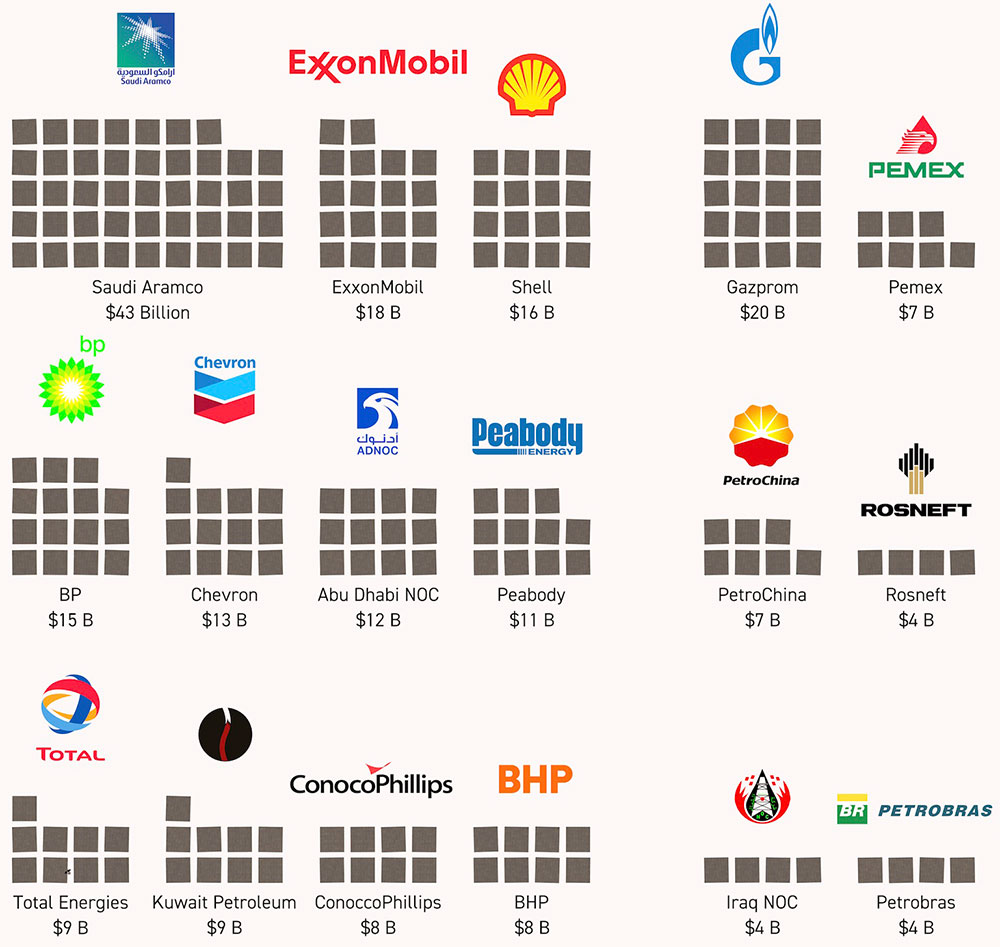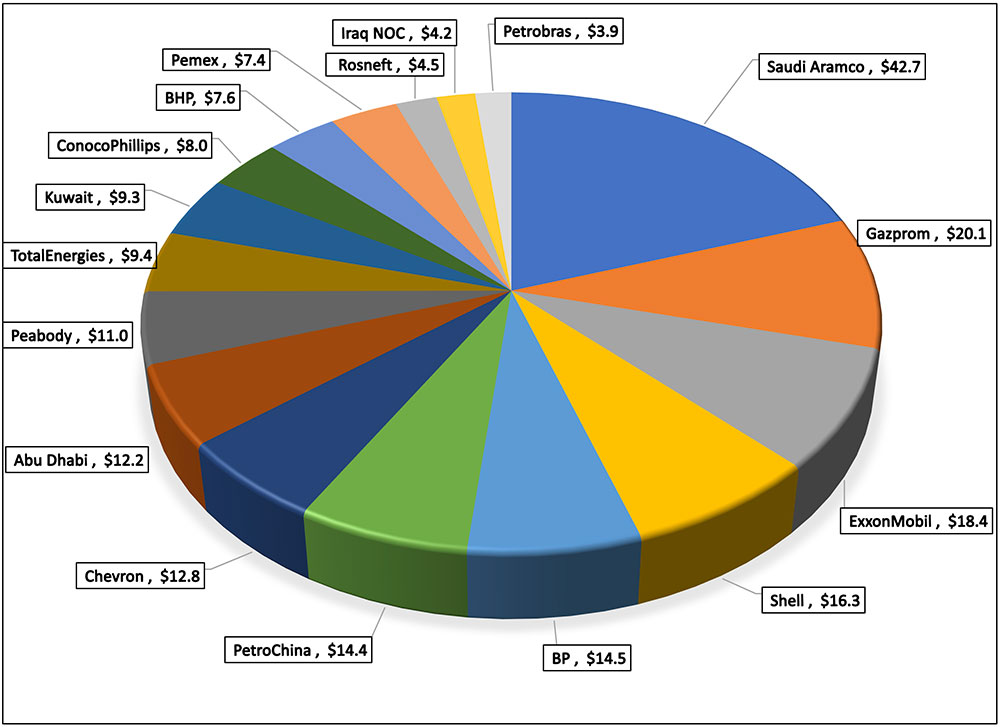Climate accountability as a fulcrum
for climate stewardship.
News Updates
News Update 4 April 2024
We are excited to announce that our colleagues at InfluenceMap in London has released a full update of the Carbon Majors dataset to 2022, and published a Carbon Majors launch report.
The launch attracted considerable media attention, and we list a few leading articles:
Watts, Jonathan (2024) Just 57 companies linked to 80% of greenhouse gas emissions since 2016, The Guardian, 3 April.
Ives, Matthew, Belinda Wade, & Saphira Rekker (2024) Only 57 producers are responsible for 80% of all fossil fuel and cement CO2 emissions since 2016 – new report, The Conversation, 4 April.
Fassler, Joe (2024) Vast Majority of Global CO2 Emissions Tied to Just 57 Entities, DeSmog, 4 April.
• Carroll Muffett / Center for International Environmental Law, President & CEO
Rick Heede was the first person to calculate and publish just how much carbon dioxide and methane had been produced by the major oil, gas, and coal producers since the industrial revolution. His data showed that just a couple of dozen companies had drilled or mined the fossil fuels responsible for more than half the global carbon pollution since the mid 19th century. He also showed that it was possible to attribute specific, quantitative amounts of carbon pollution to specific companies, such as ExxonMobil’s ~2.8% of all such emissions since 1751. This work has laid a solid foundation for thinking through the legal and moral responsibility of these companies in producing the current climate crisis.
• Naomi Oreskes / Harvard University, Dept. Earth and Planetary Sciences
News Update 31 March 2024
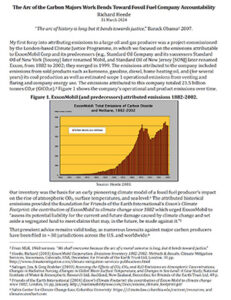
CAI has just released a retrospective essay on the history and development of the Carbon Majors project from its humble beginnings twenty years ago:
Heede, Richard (2024) The Arc of the Carbon Majors Work Bends Toward Fossil Fuel Company Accountability: a retrospective, Climate Accountability Institute, 31 March, 12 pp.
News Update 18 November 2023
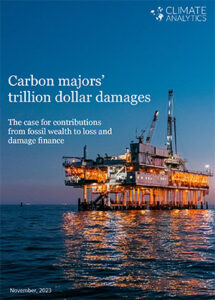
Schleussner, Carl-Friedrich, Marina Andrijevic, Jarmo Kikstra, Richard Heede, Joeri Rogelj, Holly Simpkin, and Sylvia Schmidt (2023) Carbon majors’ trillion dollar damages: The case for contributions from fossil wealth to loss and damage finance, Climate Analytics, Berlin, 36 pp.
News Update 14 August 2023
Rekker, Saphira, Guangwu Chen, Richard Heede, Matthew Ives, Belinda Wade, & Chris Greig (2023) Evaluating fossil fuel companies’ alignment with 1.5°C climate pathways, Nature Climate Change, vol. 13:927-934, online 14 August.
News Update 19 May 2023
CAI’s new study with Marco Grasso estimates climate damages and reparations due from major fossil fuel companies. Published today in the journal One Earth.
Grasso, Marco, & Richard Heede (2023) Time to pay the piper: fossil fuel companies’ reparations for climate damages, One Earth, vol. 6: online 19 May.
Lakhani, Nina (2023) Fossil fuel firms owe climate reparations of $209bn a year, says study, The Guardian, 19 May.
CAI Publication Announcement – World’s top 21 fossil fuel firms found responsible for at least $209bn in annual climate change damages
Kusnetz, Nicholas (2023) Fossil Fuel Companies Should Pay Trillions in ‘Climate Reparations,’ New Study Argues, Inside Climate News, 19 May.
News Update 23 November 2022
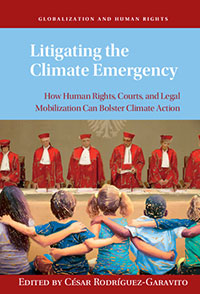 Rodríguez-Garavito, César, editor (2022) Litigating the Climate Emergency: How Human Rights, Courts, and Legal Mobilization Can Bolster Climate Action, Cambridge University Press, 408 pp. ISBN: 9781009106214.
Rodríguez-Garavito, César, editor (2022) Litigating the Climate Emergency: How Human Rights, Courts, and Legal Mobilization Can Bolster Climate Action, Cambridge University Press, 408 pp. ISBN: 9781009106214.
Heede, Richard (2022) Evolution of Corporate Accountability for Climate Change, Chapter 12 (pp. 239-254) in: César Rodríguez-Garavito, ed. Litigating the Climate Emergency: How Human Rights, Courts, and Legal Mobilization Can Bolster Climate Action, Cambridge University Press, 408 pp.
News Update 14 November 2022
Renowned Climate Scientist James E. Hansen and Other Climate Experts Sue the US Environmental Protection Agency for Failure to Phase Out Climate Pollution.
Richard Heede, Individual Petitioner, Climate Accountability Analyst, CPR Initiative Advisor
“EPA could have taken up the opportunity we presented in our Petition to fill in some of Inflation Reduction Act’s large gaps and offset some of its weaknesses, since the IRA was virtually all carrots and no sticks. Indeed, I wish our expert federal environmental agency would exercise greater leadership on this vital issue, but the law gives the Court specific authority to come to its own conclusion and direct the agency to act. The simple, incontestable fact is that greenhouse gas pollution presents an unreasonable risk to public health and to the environment.
“The Court needs to direct the Agency to do the right thing, without further delay.”
See CPR Initiative.
News Update 27 October 2022
Climate Accountability Institute is releasing its report: East Africa Crude Oil Pipeline: EACOP lifetime emissions from pipeline construction and operations, and crude oil shipping, refining, and end use.
Here we detail the emissions attributable to the French oil major TotalEnergies and the China National Offshore Oil Company from the crude oil transported via their proposed 1,443-km pipeline bringing oil from Lake Albert in NW Uganda to Port Tanga in Tanzania and shipped to global markets. THE EACOP Consortium’s Environmental and Social Impacts Assessment estimates the tiny fraction (1.8%) of emissions from pipeline construction and operation over its 25-year lifetime and ignores the 98.2% of emissions from transportation of the crude oil, refining into petroleum products, and used as intended by consumers.
Read the EACOP Press Release
Read the EACOP Report
Carrington, Damian (2022) ‘Monstrous’ east African oil project will emit vast amounts of carbon, data shows, The Guardian, 27 October.
“In Uganda, having been at the center of the campaign against the proposed East African Crude Oil Pipeline (EACOP), I have seen forced displacement of communities, police brutality on peaceful environmental activists, delegitimization of otherwise legitimate environmental institutions, abduction of human rights activists and journalists, among other ills. The proposed EACOP must not be allowed to proceed. Total Energies must be stopped!” ~ Prince Papa, Laudato Si’ Movement, and Refueling Africa, personal communication, 24 October 2022.
Watch Real World Visuals short animations:
25-year EACOP CO2 emissions from Eiffel Tower to bird’s eye view above Paris (each sphere contains 1 milllion tonnes CO2)

Real-time emissions of small spheres containing 1 kg CO2 each.
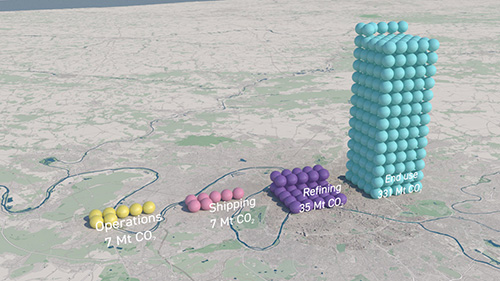
Animations by Adam Nieman and Antony Turner www.realworldvisuals.com
News Update 19 July 2022
CAI estimates emissions of carbon dioxide attributable to Swiss cement major Holcim Ltd over its history from 1950 to 2021 totaling 7,146 million tonnes CO2 in a report released today Carbon History of Holcim Ltd: CO2 emissions 1950-2021 commissioned by Bern-based HEKS (heks.ch). Holcim, combined with its merger with Lafarge in 2015, produced 7,264 million tonnes of cement over the same period. The combined company’s process emissions (from calcining limestone in high-temperature kilns) liberated 3,342 million tonnes CO2, equal to 7.5% of global cement process emissions over 1950-2021.
Non-process emissions totaling 3,922 MtCO2 is from combustion of fossil fuel and electricity and transportation fuel throughout the supply chain from limestone and materials mining to heating and transportation fuel-related emissions (scopes 1, 2, and 3).
Swiss Church Aid (HEKS), with the support of the European Center for Constitutional and Human Rights (ECCHR) and the Indonesian environmental organization WALHI launched a complaint against Holcim, demanding that the company “immediately and significantly reduce its CO2 emissions, pay compensation for damages already incurred and co-finance urgently needed flood protection measures. This is the first time that a Swiss company will be held legally accountable for its role in climate change.” See: https://callforclimatejustice.org/en/webreport/ for details.
Holcim scopes 1 (by source), scope 2, and scope 3, by source, 1950-2021.
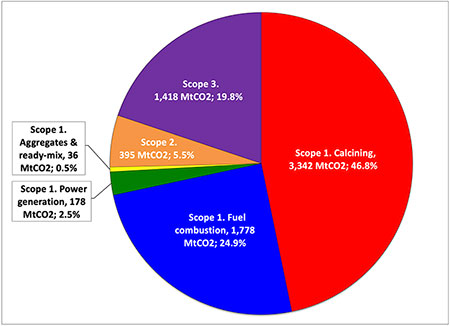
News Update 16 June 2022
Rick, in his private capacity, along with co-petitioners Donn J. Viviani, John Birks, Lise Van Susteren, and James E. Hansen, and our Counsel Dan Galpern, filed a Petition with the US Environmental Protection Agency, seeking to Phase Out Greenhouse Gas (GHG) Pollution to Restore a Stable and Healthy Climate. The Petition invokes the rules under the Toxic Substances Control Act (rev. 2016), which requires the EPA to act where a chemical substance (here, GHGs) that “present an unreasonable risk of injury to health or the environment.” Under the rules, the EPA has ninety days to respond to our petition.
The Petition, its Science section, Fact Sheet, and other supporting materials are available here: EPA Petition
News Update 6 May 2022
The Philippine Commission on Human Rights released its much-anticipated report on its nearly seven-year National Inquiry on Climate Change. Numerous climate scientists provided amicus briefs to the inquiry, and Richard Heede, along with and several international experts, lawyers, and local petitioners testified before the Commission in August 2018. We congratulate the Commissioners, the dedicated Greenpeace Philippines staff of attorneys and advocates, and the many supporters of this investigation for bringing this Commission’s findings to the public.
The Report can be downloaded here:
Commission on Human Rights of the Philippines (2022) National Inquiry on Climate Change, Quezon City, 5 May, 161 pp.
The Greenpeace Philippines Press Release
News Update 26 May 2021
Climate Accountability Institute offered its expertise and moral judgement in support of this important case:
Richard Heede declared it “One small step for Shell, one giant leap for humanity” See NPR: In Landmark Case, Dutch Court Orders Shell To Cut Its Carbon Emissions Faster
Daniel Boffey (2021) Court orders Royal Dutch Shell to cut carbon emissions by 45% by 2030, The Guardian, 26 May.
News Update 15 April 2021
Can oil majors be trusted to decarbonize to net zero by 2050?
Oil reserves, capital expenditure trends, & perverse incentives undermine the climate commitments of oil majors. Comparing BP’s self-imposed targets to those of ExxonMobil reinforces their social license to operate because it validates their leadership in the energy transition. This buys these companies more time to extract oil and gas.
Read full Press Release HERE.
Watts, Jonathan (2021) Oil firm bosses’ pay ‘incentivises them to undermine climate action’ The Guardian, 15 April.
Kenner, Dario, & Richard Heede (2021) White Knights, or Horsemen of the Apocalypse? Prospects for Big Oil to align emissions with a 1.5°C pathway, Energy Research & Social Science, online 15 April.
News Update 9 December 2020
Climate Accountability Institute releases treasure trove of data on fossil fuel company operational and product-related emissions.
Press Release – Climate Accountability Institute is releasing a new dataset quantifying how much each of the largest oil, natural gas, and coal companies has contributed to the climate crisis from 1965 to 2018. We find that the Top Twenty companies have collectively contributed 493 billion tonnes of carbon dioxide and methane, chiefly from the combustion of their products, equivalent to 35% of all fossil fuel and cement emissions worldwide since 1965 (global total of 1.41 trillion tCO2e).
Read the full Press Release HERE
Go to Carbon Majors page for new dataset HERE.
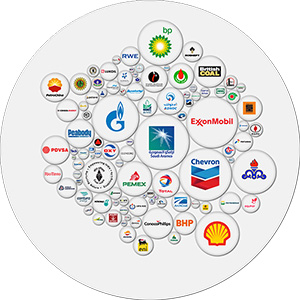
News Update – 2 June 2020
John Horgan interviewed CAI’s Director Rick Heede and was posted on Scientific American:
Horgan, John (2020) Exposing the World’s Biggest Carbon Emitters: “Energy accountant” Richard Heede does research needed to hold major polluters accountable for their actions, Scientific American, 2 June.
News Update – 11 December 1019
CAI and colleagues from Union of Concerned Scientists, University of Virginia, Ocean Conservancy, and Woods Hole Oceanographic Institution modeled the contribution of major fossil fuel companies to the acidification of the world oceans that is driven by the oceans’ uptake of roughly one-quarter of the anthropogenic emissions of carbon dioxide. The results are stunning: We find that more than half of acidification – and, by extension, half of the damages to coral reefs, fisheries, and the very web of life of the oceans – is attributable to the operational and product emissions from 88 major carbon producers from 1965 to 2015.
See our Press Release
You can download the study here. Figure (b) shows the top eleven companies (see the paper for details).
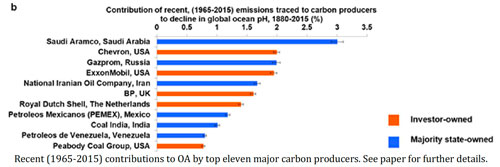
Licker, Rachel, Brenda Ekwurzel, Scott C. Doney, Sarah R. Cooley, Ivan D. Lima, Richard Heede, & Peter C. Frumhoff (2019) Attributing ocean acidification to major carbon producers, Environmental Research Letters, online 11 December.
News Update – 17 October 2019
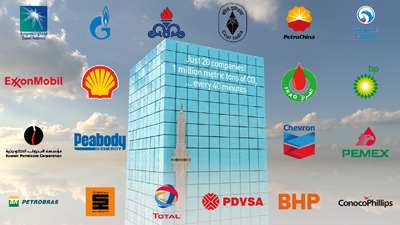
Top Twenty Carbon Majors 1967-2017, 1 million tonnes CO2e, every forty minutes. Illustration by Adam Nieman, Real World Visuals, UK.
News Update – 9 October 2019
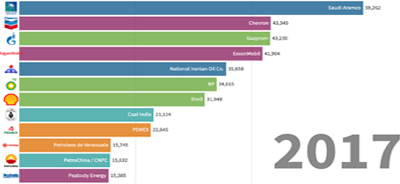
See The Race to 2017
CAI is pleased to announce an update of the Top Twenty oil, gas, and coal producers with the largest attributed emissions from 1965 to 2017. See CAI’s Publications for selected results, sample worksheets, and table of Top Twenty.
Read the Press Release.
Read It’s time to rein in the fossil fuel giants before their greed chokes the planet. CAI’s work on the Carbon Majors is the hub for the 20 articles in the Polluters Series.
Read more: The Guardian’s main story. The Guardian’s Interactive Timeline. The Guardian’s profiles of top 20 companies.
See additional information on Carbon Majors.
News Update – 30 September 2019
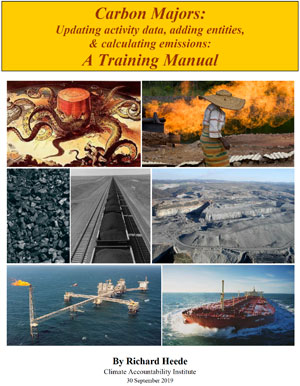
The Climate Accountability Institute releases a new report that guides other organizations on how to use our Carbon Majors database to update activity data, add new entities, and calculate emissions of operational Scope 1 and product-related scope 3 emissions. Download 4MB version here. Download 33MB version here.
News Update – 24 April 2019
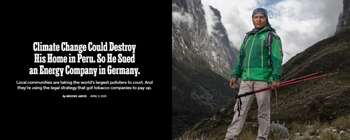
The Climate Accountability Institute’s work is prominently featured in a recent comprehensive article in the New York Times Magazine by Brooke Jarvis: Climate Change Could Destroy His Home in Peru. So He Sued an Energy Company in Germany, New York Times Magazine, 14 April, p. 28-. Link to PDF
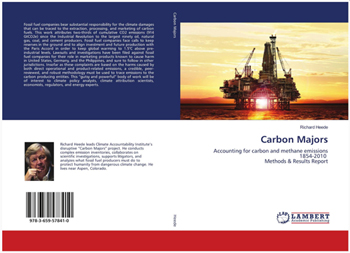
We re-issued our detailed original 2014 methodology and rationale for attributing product-related emissions to major oil, natural gas, coal, and cement producers in February, with a new preface: Richard Heede (2019) Carbon Majors: Accounting for carbon and methane emissions 1854-2010 Methods & Results Report, ISBN 978-3-659-57841-0, OmniScriptum, Riga, 148 pp. Available at OmniScriptum (61.90€); researchers and journalists may request a digital copy from CAI.
Eli Weiss of Our Wild World interviewed Rick in January: Climate Accountability with Rick Heede, Voice America, 28 January.
Numerous other newsprint and scientific articles mention our work. Our original paper in Climatic Change has been downloaded 96,000 times and cited in other peer-reviewed papers 123 times and rising. CAI maintains a running list of important media mentions and related articles, available on request. Email Rick at: [email protected].
Our work with Milieudefensie in Amsterdam in support of their lawsuit against Royal Dutch Shell, filed in early April in the Hague, helped focus the scientific background and the science based target for the complaint. See: Savage, Karen (2019) Shell Sued in the Netherlands for Insufficient Action On Climate Change, Climate Liability News, 5 April. And: Tielbeke, Jaap (2019) Big Oil in de beklaagdenbank, De Groene Amsterdammer, 10 April.
We can see the ground shift under the companies that lag in climate commitment and action. Meanwhile the progressive companies are taking their responsibility and power to help transform the global energy industry seriously. Royal Dutch Shell and Equinor are moving in the right direction both in shifting investments to a non-carbon portfolio, though both have to be urged to increase their ambition and their measurement of success as well as build flexibility as climate change accelerates. CAI’s work is devoted to providing the rationale – and the legal leverage — for fossil fuel industry action to reduce global emissions in line with the best science and ethical basis for action.
News Update – 6 September 2018
The Climate Accountability Institute is today releasing an update of the Carbon Majors Project — detailing the direct and product-related emissions traced to the major industrial carbon producers in the oil, natural gas, coal, and cement industries — through the year 2016. The work follows the methodology published in the peer-reviewed journal Climatic Change in 2014. These carbon producers — the Carbon Majors — have produced the fuels that have altered the energy balance of the atmosphere that is the primary cause of human-caused climate change.
Richard Heede was invited to testify at the National Inquiry on Climate Change hearing in Manila, 28-29 August, before the Philippine Commission on Human Rights, and gave a presentation on Climate Accountability Institutes’ work to quantify the contributions of major carbon producers to climate change and climate damages.” Several Filipino petitioners also testified at the two-day hearing, including Filipino climate scientists, and local affected peoples from the devastating typhoon Haiyan of November 2013. Experts Carroll Muffett (President of the Center for International Environmental Law, and a member of CAI’s Board of Directors), Geoffrey Supran (Post Doctoral Fellow in the Department of the History of Science at Harvard University), and Sophie Marjanac (Lawyer, ClientEarth, London) gave powerful presentations.
Rick also presented at the Strategic Climate Change Litigation Workshop, Bogota, Colombia, 11-13 July, and gave a talk to a graduate seminar in Climate and Law at the University of Amsterdam School of Law in May.
Among the broad media coverage of CAI’s work, Jason Mark’s contribution in Sierra magazine (May/June 2018) stands out: Mark, Jason (2018) The Case for Climate Reparations: who should pay the cost for climate-change-related disasters? Sierra, 27 April 2018. Read the article here.
News Update – 30 March 2018
ExxonMobil’s subpoena of Richard Heede and Climate Accountability Institute and our colleagues “is dead”. Judge Caproni rules against ExxonMobil’s attempt to block investigation: John Schwartz, Court Dismisses Exxon’s Effort to Block Climate Investigation, New York Times, 29 March 2018.
In separate action, Judge Alsup, Ninth Circuit Federal Court, requested that plaintiffs (Cities of San Francisco and Oakland) and defendants (Chevron, Exxon, BP, Royal Dutch Shell, and ConocoPhillips) each respond to a set of eight questions in an unusual climate science tutorial in open court.
Kurtis Alexander, People cause climate change, but don’t blame big oil, industry tells judge, San Francisco Chronicle, 21 March 2018.
More details on the questions (and science-based answers):
Umair Irfan, The judge in a federal climate change lawsuit wants a science tutorial, Vox, 21 March 2018.
And a related excellent article in the Guardian for context:
Damian Carrington, Can climate litigation save the world? The Guardian, 20 March 2018.
News Update – 15 December 2017
Richard Heede, “Carbon producers’ tar pit: dinosaurs beware: The path to accountability of fossil fuel producers for climate change & climate damages,” Institute for New Economic Thinking Plenary Conference, Edinburgh, 23 October 2017. INET feature and paper.
Selected publications and media mentions of CAI’s work
Economist, The (2017) New Green Advocates: Climate-change lawsuits, International Section, The Economist, 2 November.
Hulac, Benjamin (2017) Judge in Exxon case links climate skepticism with flat Earth, E&E News, 15 December.
News Update – 7 September 2017
Press Release: In a peer-reviewed study published today in the leading journal Climatic Change, the Climate Accountability Institute and colleagues with Union of Concerned Scientists and University of Oxford, demonstrated a methodology for attributing and apportioning climate impacts among major carbon producers and identified potential responsibilities of key producers.
“Like the Carbon Majors analysis that it builds on, this report demonstrates the growing precision with which major carbon producers’ responsibility for climate change and climate impacts can be quantified, allocated and, ultimately, litigated,” said Carroll Muffett, President of the Center for International Environmental Law and member of the CAI Board of Directors.
Mary Christina Wood, Philip H. Knight Professor at Univ. of Oregon School of Law, noted that “behind destructive hurricanes, wildfires, floods, heatwaves, and sea level rise is a terribly damaged climate system. This study connects the dots between the science and the corporations responsible. It is vastly important for laying the legal groundwork to hold corporations accountable before it is too late.”
Our paper:
Ekwurzel, B., J. Boneham, M.W. Dalton, R. Heede, R.J. Mera, M.R. Allen, & P.C. Frumhoff (2017) The rise in global atmospheric CO2, surface temperature, and sea level from emissions traced to major carbon producers, Climatic Change.
Henry Shue’s Springboard Commentary (Professor of politics and international relations, University of Oxford):
Henry Shue (2017) Responsible for What? Carbon Producer CO2 Contributions and the Energy Transition, Climatic Change.









